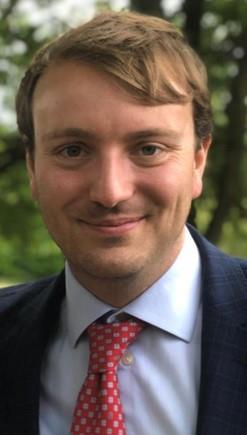
Some of the world’s most notable ideas and inventions have been born over a chat and a pint.
The development of the pH scale, Uber, Broadway show A Few Good Men and now, renewable hydrogen services firm Protium Green Solutions.
“I was working in Washington DC leading the World Bank’s research into hydrogen fuel cells. A very good friend of mine Patrick Molloy, who is also one of the advisors for Protium, was working on hydrogen for the Rocky Mountain Institute, a very well-known energy think tank.
“He was looking at deep decarbonisation of industry and we would sit and talk to each other every evening after work over beers. We chatted about the challenges in the market and one of the big things we realised was a failure of the market to provide a commercially viable business model for end users,” said Chris Jackson, the firm’s co-founder and CEO.
The pair were left wondering why, when there is such a clear and obvious need for net zero, low carbon businesses were not springing up left, right and centre.
Returning to the UK in summer 2019, Jackson set about tackling this conundrum.
He sat down with “every bright spark” he knew in the energy industry and laid out his plan to help decarbonise energy use through the deployment of green hydrogen.
And from there, Protium was born.
The firm, which Jackson set up alongside his former professor at John Hopkins University, Marco Dell’Aquila, aims to address the very business failure that he identified over drinks across the pond.
Jackson said: “You have consumer facing organisations that are looking at net zero goals within a 10 to 15 year timeframe – clearly the power and gas grids will not be net zero by then. They face a clear challenge; how do they axe their emissions without offsetting carbon?
“Most of these businesses are not energy companies. They are not going to build, own and operate large facilities so there is a need to bridge that gap.
“Typically, renewables developers are very good at identifying low carbon solutions but they’re not very good at customising them for the end customer. They don’t need to – their end customer is the grid.
“Conversely, there are very good consultants that would write some brilliant reports, but they don’t have to think about how you build the project.”
As a result, Jackson says there’s a “disconnect” for the customer, hindering them from delivering on their net zero goals.
Companies are faced with several issues, ranging from being unable to finance the assets themselves to having goals that their investors expect them to meet, a particularly prevalent theme in the ESG era.
Protium steps in and “fills that void”.
Jackson said: “We work with our customers to design and optimise a system that gets them to net zero, or at least that gives them a pathway towards it. Because we’ve designed the system with them from the very beginning, we know that we can develop it too.
“There’s no gap from the client perspective. We cover the end-to-end process and, ultimately, we then look to finance and operate the assets ourselves.
“We’re then resolving a market failure as well – there’s all this financial capital that wants to support decarbonisation but it can be very difficult to get exposure to a lot of these asset classes. Protium is filling a market need, not just a client and technical need.”
When it comes to work Protium, which is headquartered in London, is currently engaged in, Jackson has to keep his cards close to his chest.
“There are some enormous projects that we are working on which are just covered by confidentiality,” he explained.
“One of the challenges in this market at the moment is that, beneath the headlines, there are a huge number of projects ongoing that are very transformative, but they’re very secretive too. Everyone is partly waiting to see where the policy landscape will go.”
Jackson was able to reveal that one of the schemes they are working on involves mammoth capital expenditure of almost £180 million.
One project that has hit the headlines is Protium’s work leading a feasibility study into the use of green hydrogen in distilling whisky.
Housed at the Bruichladdich Distillery on Islay, a favourite tipple of Hollywood star Harrison Ford, the firm is assessing whether on-site hydrogen combustion technology can be used to heat the Victorian stills to produce Scotland’s national drink.
And Jackson, who also co-hosts the Everything About Hydrogen podcast, sees enormous potential for the fuel north of the border.
“What you’ve got is a hugely interesting market in the hydrogen context in Scotland. We have a lot of friends that are based up there.
“One of the challenges for us is that, given that there are so many areas of opportunity, it’s a question of where do you base yourself? We’re still a young company, we have to be careful with resources.
“In terms of Scotland, it’s a challenge to know where to focus. Do you go for Orkney, the West Coast or the big cities? That’s something we’re going to spend a bit more time figuring out as we understand and develop a clearer view on where the best opportunities in Scotland are for us.”
Earlier this year, Protium closed its second funding round that raised more than a million pounds, with the firm appointing two new board members and three more staff as a result.
Jackson said the process has given him “confidence” as much as anything else, especially given it was organised during Covid.
And he has clear goals to use the money to ensure Protium is at the forefront of the net zero drive.
Jackson said: “Protium’s ambition is to be the leading green hydrogen energy company in the UK. Our target is to have close to a gigawatt of green hydro electrolysis projects built or under development by 2025 within the UK.
“We want to be delivering material reductions in CO2 levels of more than 100,000 tons a year. It’s really important to me that we’re in a position where we can help support the broader UK supply chain.
“I want to be employing people in different parts of the UK and I want to be able to demonstrate the best of what different regions can do with a view to, ultimately, expanding into international markets.”
Recommended for you


 © Supplied by Boldspace
© Supplied by Boldspace